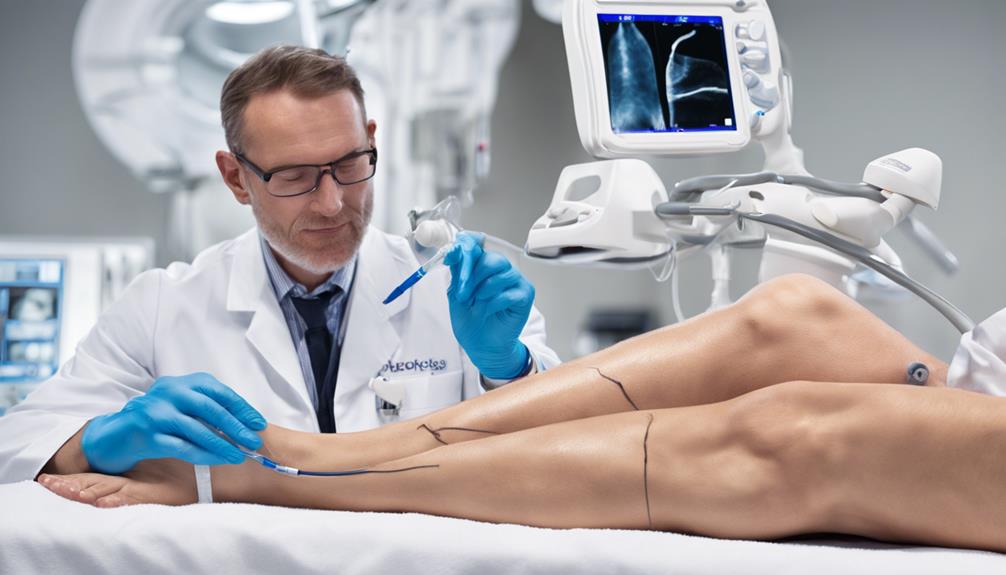Varicose veins, which commonly appear in the legs, can be treated using a variety of methods. Factors such as obesity, family history, and spending long periods standing can increase vein pressure and lead to the condition. Symptoms such as pain, itching, and swelling indicate the need for evaluation. Engaging in regular exercise, losing weight, and using compression stockings can help manage symptoms in a conservative manner. Procedures like laser ablation and sclerotherapy offer more advanced treatment options. It is crucial to monitor outcomes to prevent complications like ulcers. Important prevention measures include wearing compression stockings and maintaining a healthy weight. By following these strategies, individuals can find relief and enjoy improved long-term outcomes in effectively managing varicose veins.
Key Takeaways
- Regular exercise improves circulation and reduces varicose vein risk.
- Weight loss alleviates pressure on veins, easing symptoms.
- Compression stockings reduce swelling and discomfort.
- Interventional procedures like laser ablation offer effective treatment.
- Monitoring varicose veins and maintaining a healthy weight are crucial for long-term outcomes.
Etiology and Risk Factors
Varicose veins develop due to various risk factors, including chronic cough, constipation, family history of venous disease, female sex, obesity, and prolonged standing. When we stand for extended periods, the increased intravenous pressure can strain the veins, leading to their dilation and the formation of varicose veins.
Valvular dysfunction, which causes venous reflux, plays a vital role in this process. Factors like obesity contribute to the increased pressure on the veins, while chronic coughing or constipation can exacerbate the condition by putting additional stress on the venous system.
Additionally, a family history of venous disease can predispose individuals to developing varicose veins due to inherited factors affecting vein wall elasticity and valve function. Understanding these risk factors is essential in both preventing and managing varicose veins, highlighting the importance of lifestyle modifications and early intervention to mitigate the impact of these predisposing conditions.
Diagnosis and Evaluation

Upon initial evaluation, clinicians assess various factors to diagnose and evaluate potential varicose veins, considering symptoms, risk factors, and physical examination findings.
Patients may present with a range of symptoms such as pain, burning, itching, leg aching, fatigue, or swelling.
Clinical tests like the tap test and Perthes test are used to detect venous reflux in varicose veins, aiding in the diagnostic process. It's important to note that clinical tests have limited value in detecting reflux in varicose veins compared to other methods.
Symptoms of varicose veins can worsen with prolonged standing but often improve with leg elevation. Women are more likely than men to report symptoms of varicose veins, which can manifest as either unilateral or bilateral in presentation.
Conservative Treatment Options
In managing varicose veins, incorporating conservative treatment options is essential for improving symptoms and preventing further progression of the condition.
Here are some key strategies that can help in managing varicose veins effectively:
- Regular exercise: Engaging in activities like walking, cycling, or swimming can promote better circulation and reduce the risk of varicose veins worsening.
- Weight loss: Maintaining a healthy weight can alleviate pressure on the veins, easing symptoms and preventing complications.
- Compression stockings: Wearing these specialized stockings can help in reducing swelling and discomfort by supporting proper blood flow in the legs.
- Self-care practices: Simple habits like avoiding prolonged periods of sitting or standing, eating a balanced diet, and staying hydrated can aid in managing varicose veins.
- Compression therapy: This treatment method involves applying controlled pressure to the affected area, enhancing blood circulation and reducing swelling.
Interventional Procedures

To address varicose veins effectively, medical professionals often employ interventional procedures such as endovenous laser ablation, radiofrequency ablation, and foam sclerotherapy.
Endovenous laser ablation uses laser energy to seal off the problematic vein, causing it to close and redirect blood flow.
Radiofrequency ablation, on the other hand, utilizes radiofrequency energy to heat and shut down the affected vein, guiding blood to healthier vessels.
Foam sclerotherapy involves injecting a foam solution into the vein, prompting it to scar and close, rerouting blood through better-functioning veins.
These minimally invasive procedures provide effective alternatives to traditional surgery for treating varicose veins. They offer shorter recovery times and fewer complications, making them favorable options for individuals seeking to address varicose veins without undergoing extensive surgical procedures.
Medical professionals consider these interventions when determining the most suitable treatment plan for managing varicose veins.
Outcome Data and Prognosis
Regularly monitoring varicose veins and understanding their outcomes is important for ensuring effective management and prognosis. When dealing with varicose veins, it's essential to take into account potential complications like venous ulcers and deep vein thrombosis, which can impact long-term outcomes.
Recurrence rates post-surgical treatment can range from 20% to 28%, highlighting the importance of ongoing care. To improve prognosis, implementing prevention methods such as wearing compression stockings, maintaining a healthy weight, and engaging in regular exercise is key. Lifestyle modifications, along with treatments like endovenous ablation and compression therapy, can markedly reduce symptoms and enhance overall long-term outcomes.
Primary care providers play a crucial role in educating patients about prevention strategies and managing varicose veins effectively. By working together and staying informed, we can aim for better outcomes and quality of life for individuals dealing with varicose veins.
Frequently Asked Questions
What Is the General Management for Varicose Veins?
We manage varicose veins with lifestyle changes like exercise, weight loss, and avoiding prolonged standing. Compression stockings improve circulation and reduce symptoms. Elevating legs reduces swelling. Consistent self-care practices such as exercise and weight management are essential.
What Is the Most Effective Treatment for Varicose Veins?
For varicose veins, the most effective treatment varies based on severity. Options include endovenous thermal ablation, sclerotherapy, surgical interventions like ligation, and newer techniques like VenaSeal. Combining treatments can offer thorough management.
What Are the Three E's for Varicose Veins?
When dealing with varicose veins, remember the three E's: Exercise, Elevation, and Elastic compression stockings. These simple steps improve circulation, reduce swelling, and provide support to prevent discomfort. Embrace the three E's for healthier legs.
What Is the Gold Standard Treatment for Varicose Veins?
Endovenous thermal ablation, like laser or radiofrequency ablation, is our go-to for varicose veins. It efficiently closes off problematic veins using heat, redirecting blood flow. This minimally invasive procedure boasts a success rate over 90%.
Conclusion
To sum up, managing and treating varicose veins is important for maintaining healthy circulation and preventing complications.
Remember to stay active, elevate your legs, and wear compression stockings to help improve symptoms. Additionally, staying hydrated and maintaining a balanced diet rich in fiber can help improve circulation and overall well-being. By addressing potential causes of constipation, such as lack of fiber, dehydration, or a sedentary lifestyle, you may further enhance your comfort and health. Consistent movement not only supports digestion but also aids in reducing swelling and discomfort in the legs.
If conservative treatments aren't effective, consult with a healthcare provider for further evaluation and possible intervention.
Just like a garden that needs regular care and attention to flourish, our veins also require proper care and maintenance to keep them healthy and functioning properly.









